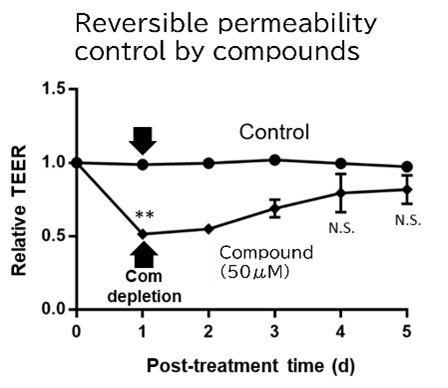Summary
- A CLDN5-binding molecule (small molecule) that temporarily loosens CLDN5-mediated adhesions between vascular endothelial cells responsible for the function of the blood-brain barrier (BBB) to facilitate intracerebral drug delivery.
- The mechanism of action is to increase the permeability of the BBB by partially weakening cell-cell adhesion to deliver small and medium-sized molecules to the brain.
- The technology opens the BBB for a short period of time, so there is no risk of opening the BBB for an extended period of time.
- We look forward to working with companies interested in developing brain delivery technologies and with companies that have drugs that they would like to have delivered to the brain.
Technology Overview & Background
Compared to blood vessels in other organs, the permeability of cerebral blood vessels is kept extremely low. This function is called the Brain Blood Barrier (BBB), and it plays an important role in protecting the brain from foreign invasion. On the other hand, the BBB also prevents the delivery of drugs from the bloodstream to the brain, which is a major obstacle to the development of drugs for brain diseases. The function of the BBB is mediated by the high degree of adhesion junctions formed between brain capillary endothelial cells, and the claudin (CLDN) family members play an important role in the formation of these adhesion junctions. Among them, CLDN5 has been shown to be responsible for BBB function.
Focusing on the function of CLDN5 in the BBB, the researchers found a small molecule compound that binds to CLDN5 and transiently loosens the adhesion between CLDN5 between vascular endothelial cells, allowing small and medium molecules to penetrate between cells. This molecule facilitates drug delivery into the brain via this activity. The binding of the compound to CLDN5 is transient, and there is little risk of prolonged opening of the BBB due to reversible permeation control. This technology is expected to contribute to the intracerebral delivery of low and medium molecular weight drugs.
Data
 |
Patent(s)
Pending (unpublished yet)
Principal Investigator & Academic Institution
Yoshihiko Okada / Associate Professor, Graduate School of Pharmaceutical Sciences, The University of Osaka
Expectations
Currently, our laboratory is investigating the improvement of permeability activity using derivatives of the compound. We are looking for companies that are interested in developing this technology as a brain-delivery DDS together with us, or companies that have drugs that they want to deliver to the brain and would like to validate them using this technology. Direct meetings with our researchers are also available. We can also discuss the disclosure of unpublished data, etc. by concluding a nondisclosure agreement with The University of Osaka, so please feel free to contact us.
Project No.DA-04836



